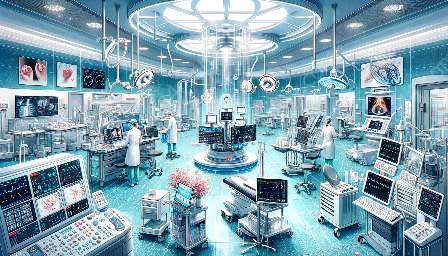Biotechnology plays a crucial role in improving the efficiency and accuracy of medical monitoring devices, ultimately enhancing patient care and advancing healthcare technology. By leveraging biotechnological advancements, medical devices can achieve greater precision, sensitivity, and reliability, leading to improved diagnostic capabilities and treatment outcomes.
The Role of Biotechnology in Enhancing Medical Monitoring Devices
Biotechnology encompasses a wide range of techniques and applications that involve using biological systems and organisms to develop products and technologies for various fields, including healthcare. When applied to medical monitoring devices, biotechnology can revolutionize the way we monitor and manage patient health. By utilizing biotechnological tools, such as genetic engineering, molecular biology, and bioinformatics, medical devices can be enhanced to provide more accurate and real-time data, leading to better-informed clinical decision-making and personalized patient care.
Improving Sensitivity and Specificity
One of the key advantages of incorporating biotechnology into medical monitoring devices is the ability to improve sensitivity and specificity. Biotechnological innovations enable the development of highly sensitive and specific biosensors that can detect and quantify biomarkers, pathogens, and other relevant substances in the body. This enhanced sensitivity and specificity empower medical devices to identify subtle changes in a patient's health status, allowing for early detection of diseases and prompt intervention.
Enhancing Data Analysis and Interpretation
Biotechnology also contributes to improving data analysis and interpretation within medical monitoring devices. Advanced biocomputing and bioinformatics tools enable the processing of complex biological data, such as genomic, proteomic, and metabolomic information, to generate meaningful insights for healthcare professionals. By harnessing these biotechnological capabilities, medical devices can deliver more accurate and actionable information, facilitating precise diagnosis, treatment monitoring, and disease management.
Biotechnological Innovations Driving Device Efficiency
Several biotechnological innovations are driving the enhancement of medical monitoring devices, paving the way for more efficient and effective healthcare technologies. These innovations include:
- Microfluidics and Lab-on-a-Chip Technologies: Biotechnology has led to the development of miniaturized diagnostic platforms that integrate microfluidic systems and lab-on-a-chip technologies. These advancements enable the precise manipulation and analysis of small fluid volumes, offering rapid and accurate diagnostic capabilities while minimizing sample and reagent consumption.
- Genomic Sequencing and Personalized Medicine: The advent of genomic sequencing technologies has revolutionized personalized medicine, allowing medical monitoring devices to incorporate genetic information into patient care. Biotechnological advancements in genomics enable the identification of genetic predispositions, pharmacogenomic profiles, and disease markers, empowering healthcare professionals to customize treatment strategies and optimize therapeutic outcomes.
- Biosensor and Nanotechnology Integration: Biotechnology has facilitated the integration of biosensors and nanotechnology into medical monitoring devices, creating highly sensitive and selective sensing platforms. These biotechnological developments enable the detection of specific molecules and analytes with exceptional accuracy, opening new possibilities for non-invasive and real-time monitoring of physiological parameters and disease biomarkers.
Biotechnology and Connectivity in Medical Devices
Furthermore, biotechnology plays a pivotal role in enhancing the connectivity and interoperability of medical monitoring devices. By leveraging biotechnological advancements, such as wireless communication, cloud-based data storage, and telemedicine solutions, medical devices can seamlessly integrate with healthcare systems, providing remote monitoring, real-time consultations, and comprehensive health data management. This connectivity enables continuous patient monitoring, facilitates collaborative care, and improves overall healthcare efficiency.
Challenges and Future Perspectives
While biotechnology offers promising opportunities for optimizing medical monitoring devices, several challenges and considerations must be addressed. These include the need for stringent regulatory oversight, data privacy and security concerns, and the integration of biotechnological advancements into existing healthcare infrastructure. Overcoming these challenges will require collaborative efforts from stakeholders across the biotechnology and medical device industries, as well as regulatory agencies and healthcare institutions.
Looking ahead, the future of biotechnology in medical monitoring devices holds exciting prospects, with ongoing research and development focused on enhancing device accuracy, expanding diagnostic capabilities, and improving patient outcomes. As biotechnological innovations continue to advance, the integration of biotechnology with medical devices is poised to redefine healthcare practices and elevate the standard of patient care.


